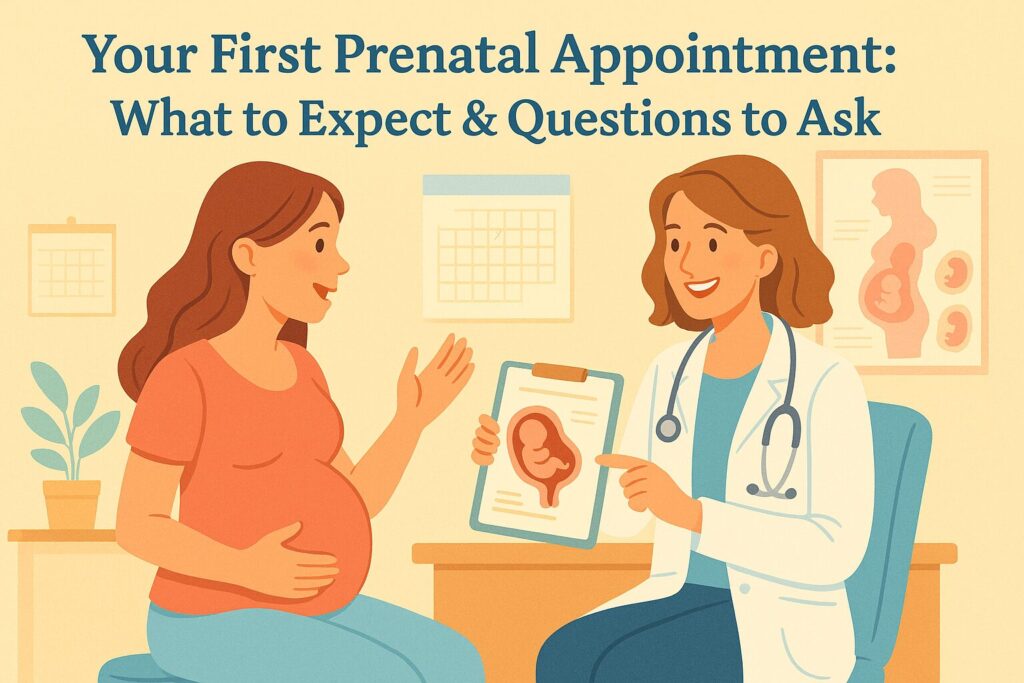Those two pink lines on your pregnancy test have opened the door to an incredible journey, and now it’s time for your first official step into prenatal care. As someone who’s sat on both sides of the exam table—as a pregnant mom five times over and as a midwife for more than two decades—I understand the mix of excitement, anxiety, and questions swirling in your mind. Your first pregnancy checkup is more than just a medical appointment; it’s the beginning of a partnership that will support you through one of life’s most transformative experiences.
Whether you’re meeting with an obstetrician, midwife, or family doctor, knowing what to expect can transform this appointment from overwhelming to empowering. Let’s walk through everything you need to know to make the most of this important visit.
When Will My First Pregnancy Checkup Happen?
One of the most common questions I hear from newly pregnant women is: “How soon should I schedule my first appointment?” The timing of your first pregnancy checkup may differ slightly depending on your provider and personal health circumstances.
Typical Timing for Different Situations
For most healthy pregnancies: Your first appointment will typically be scheduled between weeks 8-12 of pregnancy (counting from the first day of your last period).
If you have pre-existing medical conditions: Your provider may want to see you earlier, sometimes as soon as you have a positive pregnancy test. This includes conditions like diabetes, high blood pressure, thyroid disorders, or a history of pregnancy complications.
For those who’ve experienced previous miscarriages: Earlier appointments around 6-8 weeks may be recommended for reassurance and monitoring.
I remember when Sarah, a first-time mom, called our practice in a panic because she couldn’t get an appointment until week 10. She worried something might be wrong by then if she wasn’t seen immediately. I reassured her that for most healthy pregnancies, this timing is perfectly appropriate—early enough to establish important baselines but late enough that we can usually detect your baby’s heartbeat with a doppler, providing that wonderful moment of connection and reassurance.
Why Not Earlier for Everyone?
You might wonder why providers don’t see all pregnant women immediately. There are several good reasons:
- Many of the screenings performed are most accurate after 8 weeks
- The baby’s heartbeat becomes easier to detect with standard office equipment after 10-12 weeks
- Important developmental milestones have been reached, allowing better assessment
- It reduces anxiety that can come from very early ultrasounds when development is less visible
That said, if you’re experiencing concerning symptoms like significant pain or bleeding, don’t wait for your scheduled first pregnancy checkup—contact your provider right away.
What Should I Bring to My First Appointment?
Arriving prepared not only helps your healthcare team provide better care but also helps you feel more confident and in control. Here’s what to bring:
Essential Items for Your First Visit
Medical records: If you’re seeing a new provider, request your medical records be transferred ahead of time, or bring copies yourself.
List of medications: Include all prescriptions, over-the-counter medications, supplements, and herbs you take regularly.
Menstrual history information: The date of your last period, typical cycle length, and any irregularities.
Family medical history: Note any conditions that run in your or your partner’s families, especially those related to pregnancy, birth defects, or genetic disorders.
Insurance information: Cards, referrals, or pre-authorizations as required by your plan.
List of questions: We’ll discuss specific questions to ask later, but having them written down ensures you won’t forget in the moment.
Support person (optional): Having your partner, a family member, or friend present can provide emotional support and help remember information shared.
Melissa, a patient expecting her second baby, came to her first pregnancy checkup with an organized folder containing all her previous pregnancy records, current medication list, and typed questions. Her preparation allowed us to address her specific concerns efficiently and gave her confidence in navigating her care.
The Appointment Itself: What Actually Happens?
Now let’s break down what typically happens during this important first visit. While practices vary somewhat between providers, most first pregnancy checkups include these key components:
Paperwork and Medical History
Before seeing your provider, you’ll likely complete comprehensive forms about your:
- Personal and family medical history
- Previous pregnancies and outcomes
- Menstrual history
- Lifestyle factors (smoking, alcohol, exercise)
- Occupational exposures or hazards
- Current medications and allergies
- Mental health history
Be honest in your responses—this information shapes your care plan and helps identify any risk factors that might need special attention.
Physical Examination
Your first pregnancy checkup typically includes a more comprehensive physical than subsequent visits:
Vital signs: Blood pressure, pulse, temperature, height, and weight
General physical exam: Including heart, lungs, thyroid, breasts, and abdomen
Pelvic exam: Often includes:
- A Pap smear if you’re due for one
- Assessment of your uterine size
- Checking for any abnormalities
When Jenny came for her first visit, she was anxious about the pelvic exam. I explained each step before performing it and ensured she was comfortable throughout. Remember, you can always ask your provider to explain what they’re doing, take breaks if needed, or have someone else present for support.
Laboratory Tests
Your first pregnancy checkup includes several standard tests that provide important baseline information:
Blood tests typically include:
- Complete blood count to check for anemia
- Blood type and Rh factor
- Immunity to certain infections (rubella, varicella)
- Screening for infectious diseases (HIV, hepatitis B, syphilis)
- Thyroid function (sometimes)
Urine tests to check for:
- Urinary tract infections
- Protein or glucose in your urine
- Kidney function
The American College of Obstetricians and Gynecologists (ACOG) provides comprehensive guidelines about standard prenatal testing, though your provider may recommend additional tests based on your individual health history.
Dating and Viability Assessment
Confirming your due date and checking that your pregnancy is progressing normally are key components of your first visit:
Pregnancy dating methods:
- Calculation based on your last menstrual period
- Measurement of your uterus size
- Ultrasound measurement (if performed)
Checking baby’s heartbeat:
- Using a doppler (usually detectable after 10-12 weeks)
- Via ultrasound if earlier or if there’s difficulty finding the heartbeat with doppler
Hearing that heartbeat for the first time is often an emotional moment. I still remember the tears in David’s eyes when he heard his baby’s heartbeat at his wife’s appointment—even after experiencing it four times with my own pregnancies and thousands of times as a midwife, that magical “whoosh-whoosh” sound never loses its power.
Ultrasound: Will I Have One?
Whether you’ll have an ultrasound during your first pregnancy checkup varies widely depending on:
- Your provider’s practice patterns
- How certain you are about your dates
- Whether you have any concerning symptoms
- Your medical history
Some practices routinely include a dating ultrasound at the first visit, while others only perform one if there’s a specific indication. If you’re hoping for an ultrasound, it’s fine to ask in advance whether this will be part of your visit.
Essential Questions to Ask During Your First Pregnancy Checkup

Coming prepared with questions ensures you leave your first pregnancy checkup feeling informed and empowered. Here are key questions to consider:
Questions About Your Pregnancy and Baby
- What is my estimated due date?
- How does my pregnancy look so far?
- What screening tests do you recommend and when will they be performed?
- Are there any concerns based on my medical history?
- What symptoms should prompt me to call between appointments?
Questions About Your Care Plan
- How often will I have prenatal appointments?
- Who will I see at my appointments? (Same provider each time or rotating providers?)
- How do I reach someone with urgent concerns after hours?
- What hospitals or birth centers do you work with?
- What is your philosophy about pregnancy and birth?
Questions About Your Health and Lifestyle
- Are there activities I should avoid?
- What exercise is safe during pregnancy?
- Do I need to change my diet or take specific supplements?
- How much weight gain is appropriate for me?
- Are my current medications safe to continue?
Carla, a marathon runner pregnant with her first baby, was particularly concerned about maintaining her fitness. During her first pregnancy checkup, we discussed specific guidelines for running during pregnancy, heart rate monitoring, and signs that would indicate she should modify her training. Having this detailed conversation early helped her feel confident in staying active while protecting her baby’s health.
After Your Appointment: Next Steps
As your appointment concludes, you should have clarity about the road ahead. Make sure you understand:
Your Care Timeline
- When your next appointment will be
- The typical schedule for future prenatal visits
- When major screenings or tests will take place
- Your estimated due date and how firm it is
Resources and Referrals
Your provider may recommend:
- Prenatal vitamins or specific supplements
- Books or websites with reliable pregnancy information
- Prenatal classes and when to register
- Specialists if you have specific health conditions
The Centers for Disease Control and Prevention (CDC) offers excellent resources for early pregnancy, including nutrition guidelines, safety precautions, and important health information tailored to different stages of pregnancy.
Addressing Immediate Concerns During first pregnancy checkup
Before leaving, ensure you have:
- Clarity on any symptoms you’re currently experiencing
- Guidelines about what requires immediate attention
- A contact number for questions between appointments
- Any necessary prescriptions
Special Circumstances: When Your First Appointment Might Be Different
While I’ve described a typical first pregnancy checkup, certain situations may create a different experience:
High-Risk Factors
If you have pre-existing medical conditions like diabetes, hypertension, or autoimmune disorders, your first appointment may be more extensive and might include:
- Consultation with maternal-fetal medicine specialists
- Additional blood work
- Earlier or more detailed ultrasounds
- More frequent follow-up appointments
Monica came to her first appointment with a history of two previous miscarriages and type 1 diabetes. We spent extra time discussing her specific monitoring needs, including home blood sugar targets, medication adjustments, and a plan for earlier and more frequent ultrasounds to provide reassurance.
Previous Pregnancy Complications
If you’ve experienced complications in previous pregnancies, your provider will likely:
- Review your previous pregnancy records in detail
- Develop a preventative plan specific to your history
- Possibly initiate treatments earlier (like progesterone for previous preterm birth)
- Schedule more frequent monitoring
Multiple Pregnancy
If you know or suspect you’re carrying multiples (twins or more), your first pregnancy checkup may include:
- A definitive ultrasound to confirm multiple pregnancy
- Discussion of the increased monitoring you’ll need
- Earlier referral to a maternal-fetal medicine specialist
- More comprehensive nutritional guidance
During my twin pregnancy, my first appointment was notably different from my singleton pregnancies—more tests, longer discussions, and a much more detailed care plan from the very beginning.
Managing Anxiety Before and During Your First Appointment

It’s completely normal to feel nervous before your first pregnancy checkup. Here are strategies that have helped countless women (including myself) manage this anxiety:
Before the Appointment
- Write down all your questions and concerns
- Arrange for a support person if possible
- Schedule the appointment for a time when you won’t feel rushed
- Research your provider to feel comfortable with their approach
- Practice relaxation techniques like deep breathing
During the Appointment
- Express your nerves to your provider—we expect and understand this!
- Ask questions whenever something isn’t clear
- Request a moment to process information if you feel overwhelmed
- Take notes or ask if you can record important instructions
- Remember that feeling emotional is completely normal
When Alisha came for her first visit, she was visibly shaking with nervousness. We paused the clinical aspects of the appointment, spent time talking about her specific fears, and proceeded only when she felt ready. Your emotional experience matters, and good providers adapt their approach to support your needs.
When to Consider Changing Providers
Occasionally, a first pregnancy checkup reveals that a particular provider or practice might not be the right fit for you. Trust your instincts if:
- Your questions are dismissed or left unanswered
- Your provider seems rushed or uninterested in your concerns
- The practice’s philosophy doesn’t align with your birth preferences
- You feel uncomfortable with the provider’s communication style
- The logistical aspects (location, scheduling, insurance) create significant stress
Early pregnancy is an appropriate time to make a change if needed. Lisa came to me for her second pregnancy after feeling unheard during her first birth experience. Finding a provider who respected her birth preferences transformed her experience from one of anxiety to one of empowerment.
The Bottom Line: Partnership in Your Pregnancy Journey
Your first pregnancy checkup sets the foundation for your entire prenatal care experience. Beyond the medical aspects, this appointment begins a relationship that ideally provides not just clinical care but emotional support and guidance through your pregnancy journey.
After five pregnancies and thousands of first appointments with expectant mothers, I’ve seen how this initial visit can establish trust, reduce anxiety, and create a sense of partnership between you and your healthcare team. Come prepared, ask questions, express your preferences, and remember that you’re an active participant in your care—not simply a recipient of it.
This appointment is just the beginning of an incredible journey. The mix of emotions you’re feeling—excitement, nervousness, joy, and maybe even a bit of disbelief—are all part of the beautiful transition to motherhood, whether it’s your first baby or your fifth.
Your first pregnancy checkup marks the moment when your pregnancy becomes “official” in the medical world—but you’ve already begun this journey from the moment you saw those two pink lines. Trust yourself, trust the process, and know that with good care and support, you have everything you need to navigate the path ahead.




Pingback: Worried in the First Trimester? Here's What's Normal and What's Not – BABIES BLOCK